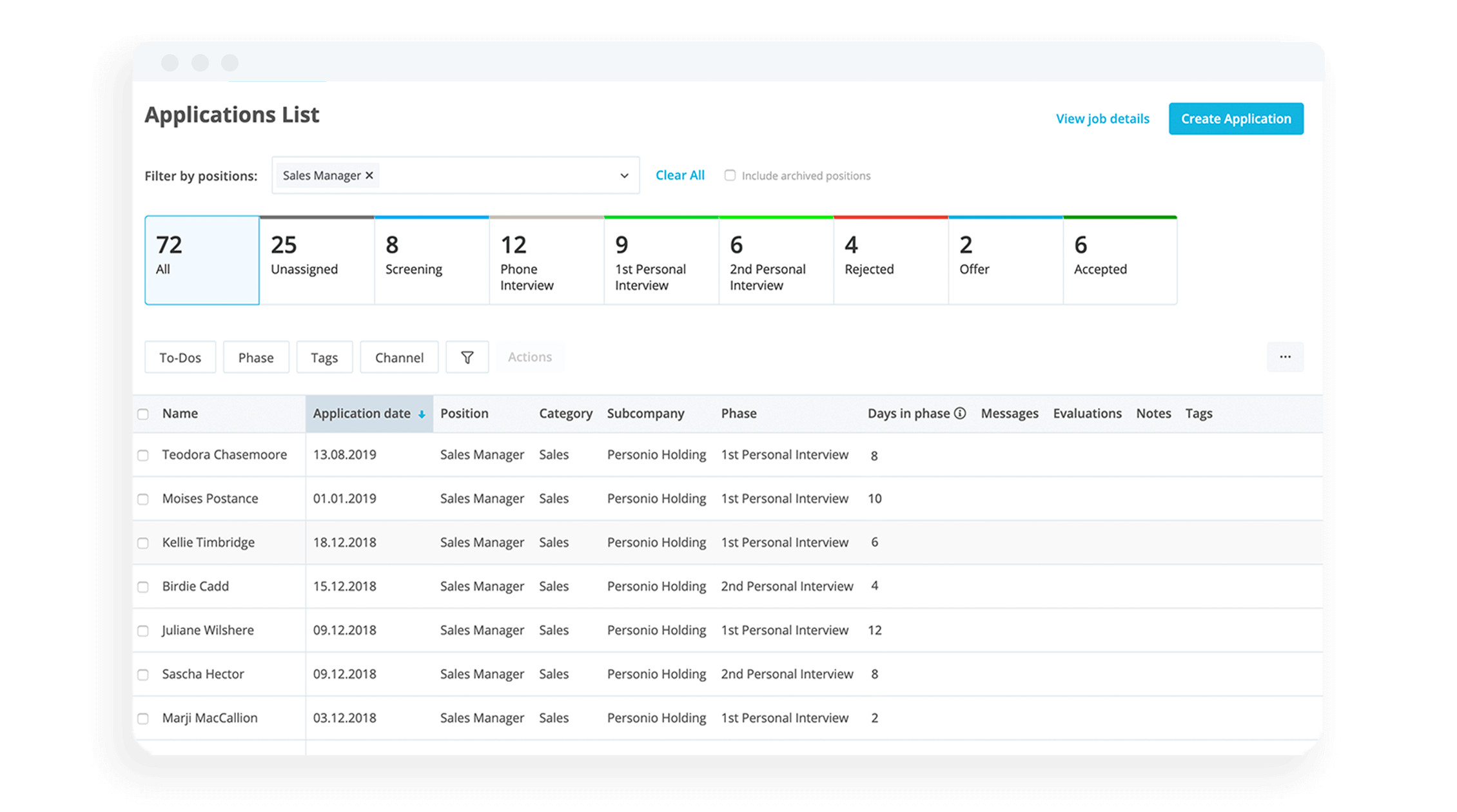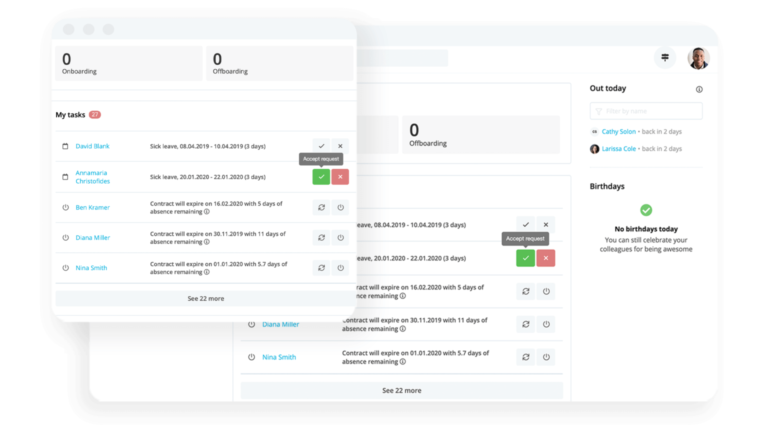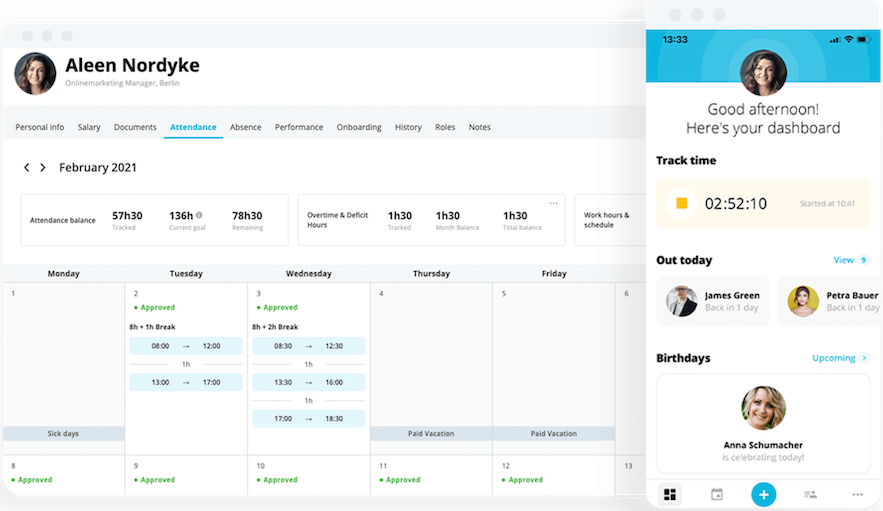Outsourcing HR in the UK: is it a good idea?
HR outsourcing could help you to reduce costs, increase efficiency and provide a better HR service to your employees — but there are also some challenges involved. In this guide, we’ll walk through everything you need to know about HR outsourcing, including the benefits and drawbacks involved and a step-by-step guide to getting started.
Key facts:
HR outsourcing can help organisations to reduce HR costs, increase efficiency and access expertise that’s not available in-house.
There are also several downsides to outsourcing HR. For example, you’ll lose a certain amount of control over your operations, and your employees might feel that the HR service they receive is less personal and human.
Outsourcing your HR operations is a big decision, and it’s not the right choice for every organisation. It’s important to carefully weigh up the pros and cons before making a decision.
What is HR outsourcing?
HR outsourcing is when an organisation pays an external party to handle its HR operations. Some companies outsource their entire HR function, while others only hand over certain tasks like payroll or recruitment.
The benefits of outsourcing HR
Here are a few of the benefits HR outsourcing can bring to an organisation:
Reduced costs: HR outsourcing can help to reduce operational costs for your HR department. However, this isn’t the case for every organisation. And in some circumstances, you may be able to decrease costs through simpler measures like implementing a technology solution to reduce process inefficiencies — which are one of the biggest drivers of HR costs.
Access to HR expertise: HR outsourcing providers employ teams of highly qualified, experienced HR professionals. For small organisations, HR outsourcing is sometimes the most cost-effective way to access this expertise.
Reduced compliance risk: Employment laws change regularly, and keeping up with them can be difficult. An HR outsourcing partner will ensure your operations are compliant with the relevant rules and regulations, even as they change.
Drawbacks of outsourcing HR
Of course, HR outsourcing also comes with some downsides. Here are some of the main ones to be aware of:
Loss of control: HR outsourcing inherently means handing over control of important processes to an external party. It’s important to carefully research any provider you’re considering working with to make sure you’re comfortable with them handling your operations.
Less personal approach: Outsourcing HR changes the way employees access HR support. They may have to use a self-service web portal or call centre for certain tasks — which can feel less personal and human.
Loss of internal knowledge: When you outsource HR to an external party, knowledge about your processes and operations is held outside of your organisation. This can make it difficult to transition back to an in-house HR model down the line.
Recruitment issues: HR outsourcing providers may not be as effective at communicating your company culture to potential hires as your internal team. If your company has a strong focus on cultural alignment when it comes to hiring decisions, it might be better to keep this aspect of HR in-house.
Turn Top Talent Into Your Next Great Hire

Speed up your entire recruiting and hiring process with Personio. See how it works below.
Hiring At Scale With PersonioWhat type of companies benefit most from outsourcing HR?
According to a recent survey from the CIPD, more than half of all organisations (53%) outsource at least one HR function. The survey also found that SMEs are more likely to outsource HR functions than larger organisations. This may be because they’re less likely to have the resources to handle them internally.
You might want to consider HR outsourcing if:
Your HR needs aren’t enough to justify hiring an internal team
You’re spending a disproportionate amount of time on HR tasks
HR tasks are currently being done by various employees in different roles
You don’t have the internal resources to effectively balance hiring new employees with managing existing ones
How to outsource HR successfully: a step-by-step guide
Thinking about outsourcing your HR operations? Here are the steps to follow.
Decide which HR operations to outsource
HR outsourcing doesn’t have to be all or nothing. Before approaching an outsourcing provider, you should think about which parts of your HR function you need to outsource.
To do this, think about the tasks that cause the biggest problems for your HR team, or that take up a disproportionate amount of their time. Many organisations outsource functions like payroll, benefits administration and other administrative tasks, while keeping tasks that require a more ‘human’ touch in-house.
1. Do your research and select a provider
There are lots of different things to consider when you’re choosing an HR outsourcing provider. Most obviously, you need to make sure they can provide the services you need, bearing in mind that your needs might change in the future.
It’s also a good idea to look for providers that allow you to build some flexibility into your contract. That way, you’ll be able to add or subtract certain services as your situation changes.
Once you’ve come up with a shortlist of potential providers, read reviews of their services online. For a deeper understanding of what working with them is like, you could even reach out to customers that currently use their services.
2. Establish a service level agreement (SLA)
It’s important to set expectations with your HR outsourcing provider. And the best way to do this is by working with them to establish a service level agreement, or SLA.
An SLA should describe the functions that the provider will perform, and detail the exact level of service that you expect. For example, a payroll provider might agree to deliver at least 95% payroll accuracy.
The SLA should also include information about how performance data will be communicated. For example, if you want the provider to send you quarterly performance updates, this should be mentioned in the SLA.
3. Manage the transition carefully
Transitioning to an outsourced HR model is a big organisational change. You’ll need to ensure your employees are aware of what’s coming, and that they have the opportunity to have their questions or concerns answered.
For example, employees will need to know exactly how they’ll be able to access any HR self-service systems or call centres, and how they’ll carry out common HR processes like requesting leave or signing up for a training programme.
If you have an internal HR team, you’ll also need to spend time preparing them for the change. You may need to redeploy certain employees and provide additional training to ensure you’re getting the best out of your team.
The key success factor in all of this is open and clear communication. You should aim to ensure everyone understands the change, why it’s happening, and what it will mean for them.
An alternative to HR outsourcing
Outsourcing HR can be a useful way of reducing operational costs, gaining efficiency and leveraging HR expertise that you may not otherwise have access to. But there are also challenges involved with moving to an outsourced model — and it may end up costing you more than keeping things in-house.
Of course, there are other ways to achieve some of the benefits of HR outsourcing. For example, deploying a tech solution like Personio can help your HR team to automate and streamline repetitive tasks, giving them more time to focus on strategic and policy-based HR work — just like HR outsourcing.
Unlike an outsourcing model, you won’t lose control over your operations or lose the HR expertise that’s currently held within your organisation. Plus, your employees will continue to get the personalised, human-centric approach to HR that they deserve.
Want to learn more? Request your free demo to see Personio in action.
Frequently asked questions about outsourcing HR in the UK
Here are the answers to some commonly asked questions about HR outsourcing.
What HR functions should not be outsourced?
Some tasks are more difficult to hand over to an external provider. For example, tasks that involve in-person interaction, like de-escalating conflicts or supporting employees through personal problems may be best kept in-house.
What is the difference between HR consultancy and outsourcing?
HR consultants are external experts who advise organisations on their HR strategies, systems and processes. They are different from HR outsourcing providers in that they’re not involved in implementing the strategies they propose.
For example, an HR consultant might advise an organisation on its recruitment strategy, but they wouldn’t be actively involved in putting that strategy in place. An HR outsourcing provider, on the other hand, might offer recruitment services like sourcing candidates, interviewing those who are shortlisted and even onboarding new hires.
Is outsourcing HR good or bad?
Whether HR outsourcing is good or bad depends on your organisation’s specific circumstances. It can be a useful solution for small organisations that don’t have the capacity to manage HR activities internally. However, it may be less cost-effective for larger organisations than managing these tasks in-house — especially when coupled with an effective software solution.

